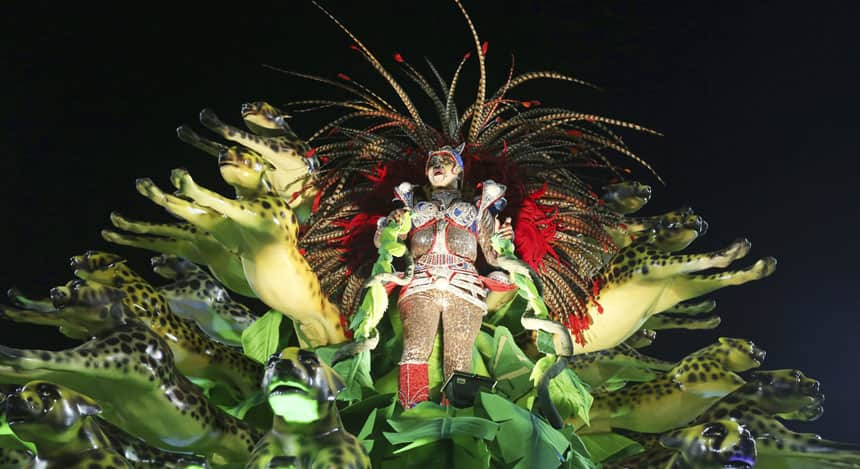[caption id=“attachment_79410” align=“alignleft” width=“860”]  India is not the only country gearing up for polls this year. Some other important emerging market governments head to crucial polls this year too. Brazil has some busy months ahead. A presidential election as well as the world’s biggest football event ( World Cup Brazil 2014) will take place this year[/caption]
[caption id=“attachment_79412” align=“alignleft” width=“860”]  President Dilma Rousseff of the Workers’ Party remains the favourite for re-election after the ‘Salad Revolution’. The country’s GDP growth estimate for 2014 is only 2%. Reuters[/caption]
[caption id=“attachment_79442” align=“alignleft” width=“860”]  The World Cup is less than 100 days away but Brazil is a logistical mess and bracing for potentially violent anti-government protests like the ones that surrounded a World Cup warm-up tournament last year.After Brazil was awarded the cup in 2007, politicians promised billions would be spent on airports, subway lines and other infra projects. While nine of the stadiums are finished, just seven of the infrastructure projects have been completed so far. Reuters[/caption]
[caption id=“attachment_79420” align=“alignleft” width=“860”]  During recent elections in Thailand, voting in the 20 percent of the electoral districts were suspended, especially in Bangkok and Southern areas of this Asian country, controlled by the opposition Democrat Party. Voters of 35 Thailand districts who could not vote in February 2 elections due to antigovernment protests could vote on April 5 and 27.[/caption]
[caption id=“attachment_79419” align=“alignleft” width=“860”]
 Anti-government protesters hold “No Vote” stickers and Thai baht banknotes to donate to their leader during a march through Chinatown in Bangkok February 1, 2014. The Bank of Thailand is concerned that the country’s 2014 economic growth could be lower than last year ( it is pegged at 2 percent)if a new government cannot be formed by the third quarter, while tourism has suffered an adverse impact from the political protests in Bangkok that started in November.
Reuters[/caption]
[caption id=“attachment_79422” align=“alignleft” width=“860”]  With municipal elections taking place on March 30, Turkey is entering into an eight-month long election cycle at a time when the country is undergoing considerable domestic turmoil. Local elections in Turkey will provide the first test for Recep Tayyip Erdogan’s AKP government after the Gezi Park protests.Reuters[/caption]
[caption id=“attachment_79425” align=“alignleft” width=“860”]  Demonstrators form a slogan reads that: “Murderer is coming” during an anti-government protest at Gundogdu square in the Aegean port city of Izmir. Turkey’s GDP growth estimate for 2014 is 3.5%. Reuters[/caption]
[caption id=“attachment_79428” align=“alignleft” width=“860”]  Supporters of ruling AK Party (AKP) cheer as Turkey’s Prime Minister Tayyip Erdogan (not pictured) arrives an election rally in Malatya March 6, 2014. Reuters[/caption]
[caption id=“attachment_79430” align=“alignleft” width=“860”]  Indonesia is gearing up for the fourth round of legislative elections since the fall of the authoritarian New Order regime in 1998. President Susilo Bambang Yudhoyono leaves office amid fuel price hike protests, flailing equity markets and a depreciating currency. Newcomer Jakarta governor Joko Widodo leads big-name candidates in the polls. Th country’s 2014 GDP forecast is 5.3 percent. Reuters[/caption]
[caption id=“attachment_79431” align=“alignleft” width=“860”]  The 2014 Indonesian legislative election to elect members of both national and regional legislatures will take place on 9 April 2014. Reuters[/caption]
[caption id=“attachment_79432” align=“alignleft” width=“860”]  Jakarta governor and presidential candidate Joko Widodo, of the Indonesian Democratic Party of Struggle (PDI-P), interacts with supporters during a party campaign at Cengkareng soccer field in Jakarta March 16, 2014. Reuters[/caption]
[caption id=“attachment_79435” align=“alignleft” width=“860”]

The 2014 South African general election will be held on 7 May 2014,to elect a new National Assembly and new provincial legislatures in each province. Jacob Zuma’s African National Congress (ANC) is expected to be re-elected, but faces growing challenges from the left and right, as well as labour unrest and high unemployment. Reuters[/caption]
[caption id=“attachment_79437” align=“alignleft” width=“860”]  Supporters of Julius Malema’s Economic Freedom Fighters (EFF) party cheer at the launch of the EFF’s election manifesto in Tembisa township, east of Johannesburg. The country’s 2014 GDP growth forecast is 2.8 percent. Reuters[/caption]


)
)
)
)
)
)
)
)
)



